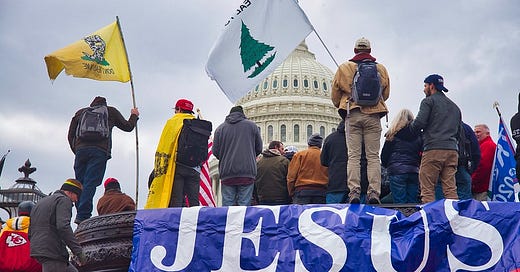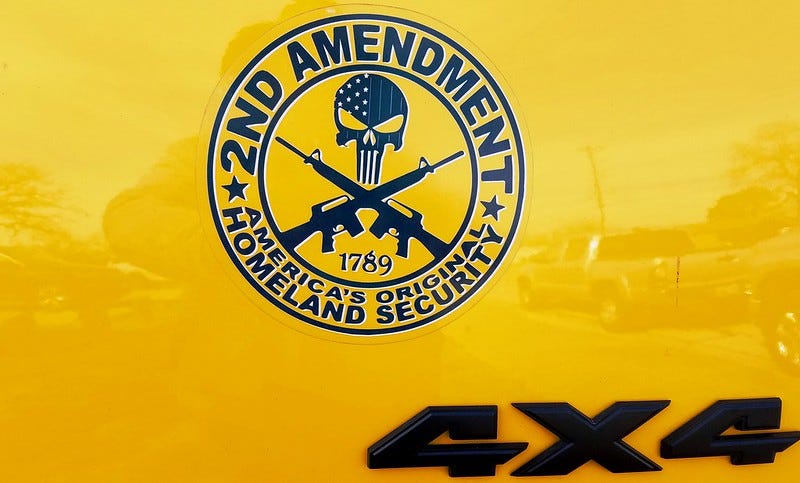Photo by Brett Davis. Used under Creative Commons Attribution-Non-Commercial license.
“I contend that America is a religion…Our religious symbols are guns and dollar bills. We hold those symbols to be sacred,” the Rev. Dr. Emma Jordan-Simpson told me on inauguration day. We were discussing the role religion played in the January 6th insurrection. Jordan-Simpson runs Fellowship of Reconciliation (FOR), which focuses on overcoming social injustice through interfaith efforts that embrace active non-violence.
“One does not have to be a Christian to be a white supremacist,” she went on. “And I would dare say that those who were among that crowd on January 6th had a lot in common. And though you saw the flag, the Christian flag, and you saw the cross, there was a lot more for people to bond over. They'd have had everything to do with what it meant to be American and what it meant to be white.”
The vision of the United States that the insurrectionists bonded over, Jordan-Simpson says, is based on a lie. It ignores the country’s “birth defect:” the role of chattel slavery and indigenous genocide in the United States’ development.
“We came here and found the wilds and cleared the land. And, you know, with our ingenuity in our hearts, work with the sweat of our brow, the work of our hands, we created, we built this shining star as example to the world,” Jordan-Simpson recites.
“That is not what happened, but that is our national myth. And it is what's baked into our education.”
Christian nationalism was on display on the 6th along with other trends, like QAnon and pro-gun extremists. Still, Jordan-Simpson’s reading of United States exceptionalism, its existence a manifestation of divine favor, recognizes that this perspective conflates God and state in a way that contravenes the basic constitutional tenet of keeping the two separate. The insurrection, Jordan-Simpson imagines, with its commingling of patriotic and Christian fervor, “was our founding fathers’ worst nightmare.”
In 1936, as Hitler violated the terms of the Treaty of Versailles and pushed Germany toward a new war, James Waterman Wise warned that if fascism were to come to the United States, it would be: “wrapped up in the American flag and heralded as a plea for liberty and preservation of the constitution.” The similarities between this prediction and the calls that have been made over the past year against mask wearing and the outcome of the election should be disturbing.
Christianity Today’s Tish Harrison Warren wrote that responsibility for the January 6th coup attempt “must be in part laid at the feet of those evangelical leaders who ushered in and applauded Trump’s presidency. It can also sadly be laid at the feet of the white American church more broadly.”
Within military and police circles, there have also been signs for years. Reveal published an investigation into secret Facebook groups with police officers and members of the military in 2018. That investigation found rampant Islamophobia along with hate speech and racist memes.
The Military Religious Freedom Foundation (MRFF) has been warning about fundamentalist Christianity within the U.S. military for nearly two decades. The MRFF aims to ensure that all members of the United States Armed Forces are able to practice their religion freely, as outlined in the First Amendment. Michael “Mikey” Weinstein, who is Jewish, founded the MRFF after his son, Curtis, experienced antisemitism at the Air Force Academy in 2005.
Now, the MRFF boasts some 72,000 members by Weinstein’s count. Most, he says, are Christians who are “tortured because they aren’t Christian enough.” That is, they don’t subscribe to a more evangelical version of Christianity.
In the wake of the January 6th insurrection, Weinstein published a statement describing the spread of fundamentalist Christianity and Christian supremacy within the U.S. military as “shockingly systemic.” Larry Brock, who was photographed in the Capitol carrying zip ties and wearing body armor, is an Air Force vet and an Air Force Academy graduate.
“[Fundamentalist Christianity] is ubiquitous. It is tied into the very DNA of America,” Weinstein said in an interview. “We are dealing with a national security threat internally to our country every bit as bad as what we’re facing externally with ISIS, Al Qaeda, you name it.”
The aftermath of the insurrection suggests Weinstein is right. An analysis by NPR found that roughly 20 percent of those arrested for participating in the insurrection were former military.
Military Times also reported last year that episodes of white nationalism or ideologically-driven racism were increasing. According to a survey, more than a third of active-duty troops had witnessed such hate. That figure increased to half among service people of color.
The cost to Weinstein of standing up for religious freedom within the military has been an ongoing flood of hate mail, death threats and an attack on his home.
Weinstein points to Dominion Christianity and the Seven-Mountain Theory as central tenets of Christian nationalism. Sociologist Sara Diamond writes that some interpret Genesis 1:26 to signify "that Christians alone are Biblically mandated to occupy all secular institutions until Christ returns--and there is no consensus on when that might be."
Photo by Gilbert Mercier. Pick-up truck with 2nd Amendment (gun right) stickers. The Punisher skull symbol is used by QAnon. Used under Creative Commons Attribution-Non-Commercial license.
Brad Christerson, also a sociologist, argues that Independent Network Charismatic groups have played a particularly important role in theologically justifying rejecting the election results and, ultimately, building the movement that stormed the Capitol. These groups are not affiliated with a formal denomination and consequently face fewer constraints.
In an article published in The Conversation, Christerson writes:
INC beliefs are different from those of most traditional Christian groups, including those affiliated with official Pentecostal denominations. INC promotes a form of Christian nationalism the primary goal of which is not to build congregations or to convert individuals, but to bring heaven or God’s intended perfect society to Earth by placing “kingdom-minded people” in powerful positions at the top of all sectors of society, the so-called “seven mountains of culture” comprising government, business, family, religion, media, education and arts/entertainment.
The January 6th insurrection is not the only time or place when Christianity and nationalism have merged. German philosopher Dorothee Solle coined the concept of “Christofascism” in 1970 as she attempted to understand both how churches enabled Nazism’s rise and individuals’ responsibility for that regime. Solle described “Christofascists” as antisemitic, racist and willing to use violence to achieve their ends.
Common characteristics of fascism include exaltation of the military, concentration of power in a single leader, disdain for liberal politics and culture as well as for parliamentary democracy. Arguably, these were all on display during the January 6th attack which saw not only an attempt to halt the electoral process, but also violence against journalists.
Imperialism is another characteristic of fascism, and the U.S. is exporting some of the values and beliefs that underpinned the insurrection. For example, Brazil’s investigative outlet Ágência Pública revealed that Ralph Drollinger’s Capitol Ministries placed conservative pastors in six Latin American capitols after Donald Trump took office. The organization aims to install 200 ministries in 200 global capitols, according to its website.
Right Wing Watch has highlighted Drollinger’s writing that “the critical and preeminent duty of the Church in an institutionally separated society” is “to evangelize and disciple—to Christianize—the leaders of the State and its citizenry.”
Capitol Ministries also offers pastoral guidance in at least 32 U.S. state houses. One of the organization’s Bible Study sessions focuses on when the Bible justifies war. Another is entitled: Coming to Grips with the Religion of Environmentalism.
The growth of fundamentalist sects, however, represents a counterpoint to the bulk of the country, which is moving away from organized religion, according to Pew research. The Pew Research Center published a report in mid-January stating that the number people who identify as having no religious affiliation has been growing while those who identify as Christians has been decreasing. The Center’s most recent poll found that 63 percent of adults in the U.S. identify as Christians compared to 77 percent in 2009. Those identifying as having no religious affiliation has increased to 28 percent from 17 percent.
Jordan-Simpson, however, contends that Pew focuses on mainstream religious beliefs and misses important phenomena, such as Independent Network Charismatic groups.
Instead of ostracizing those who hold Christian-nationalist or white-supremacist beliefs, though, Jordan-Simpson says that white folks “need to go home” and listen to their family and neighbors. She compares the work of connecting with those in one’s own sphere of being ordained into a ministry because of the challenges involved.
“This is not about logic and charts and graphs,” Jordan-Simpson said. “This really is about how we figure out how to enter into different kinds of relationships with people who are dealing with different facts.”
Fellowship for Reconciliation has some support systems for those wishing to embark on this “ministry.” Before the pandemic, FOR began working with a group called The People’s Supper, which offers a guidebook for multi-racial communities looking to work towards healing. Jordan-Simpson also pointed to the Presbyterian Peace Fellowship as an example of what a denomination could do to work towards social justice and to include people with different perspectives.
“It's not the end-all; it's not a silver bullet, but it is a beginning,” says Jordan-Simpson.
*An early version of this essay incorrectly identified the Rev. Doctor Jordan-Simpson as Jordan-Simmons. We apologize for the mistake.
Lisa Davis edited this essay. She can be reached at mslisadavis64@gmail.com
Reporters Without Borders has criticized how Facebook and Twitter “deplatformed” Donald Trump. The group argues that such decisions should not be entrusted to private companies.
This article from Vice describes the tactics IRI Consultants employed to discourage worker organizing at Google. The dossiers compiled identified characteristics that could be weaponized, such as being a single mother.




